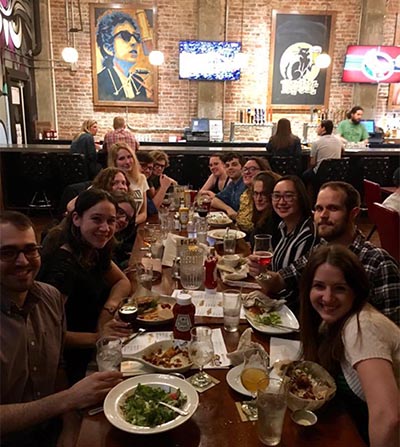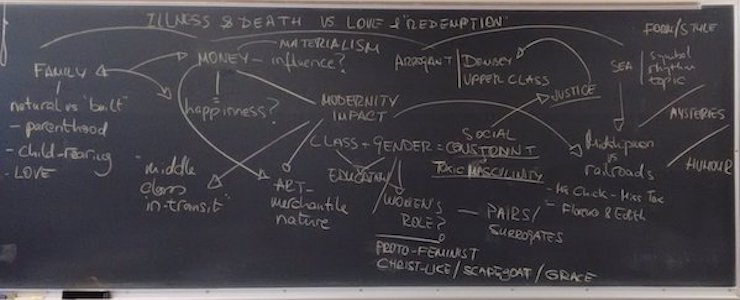Graduate Students
Professional Opportunities for Graduate Students of the Dickens Project
The Dickens Project welcomes graduate students not only to the universe of Dickens but also to the universe of academe. Graduate students from consortium institutions have the opportunity to attend the Dickens Universe as well as the annual graduate student winter conference.
The Dickens Universe
The activities described below prepare students for various facets of an academic career. Graduate students from consortium institutions have the opportunity to participate in one of these options each year during the summer conference in Santa Cruz known as the “Dickens Universe.”
Students nominated to represent their university at the conference will be emailed a link to a registration form allowing them to indicate which of the following professional activities they prefer to attend. Workshops and seminars meet daily for one
ACTIVE LISTENING WORKSHOP
Active listening, for the purposes of this workshop, involves at least three components: engaging with and following complex talks by others, taking what works for you from a talk and forming questions about it for yourself and for the speaker, and learning what helps your own audience understand your argument. This workshop will focus on how to follow academic presentations, how to ask and answer questions, and how to write to be heard rather than to be read. The Dickens Universe offers a unique opportunity to listen and respond to a rich variety of academic presentations; over the course of the
PEDAGOGY WORKSHOP
This group discusses practical ways to enhance teaching. For example, topics might cover asking productive discussion questions, designing successful writing assignments, the special challenges of teaching long novels, ways to interweave genres in a course, shaping a syllabus (particularly for a nineteenth-century course), and all in between. Students may meet assistant professors who are in the throes of designing new courses and senior faculty who have long experience of teaching at different levels. This workshop is designed for students at all levels of teaching experience.
PRESENTATION WORKSHOP
Students at any level are invited to submit a 200-word proposal describing a text designed for oral presentation. Two consortium faculty members will lead a small group of students in this workshop on the oral delivery of written texts. Students should bring the proposed piece of writing (no more than two to three pages) to Santa Cruz for this hands-on activity. Likely projects include the opening pages of a conference paper or the introduction to a job talk. The workshop meets three days for one hour each day and is excellent preparation for those beginning to present their work at conferences as well as those preparing for job talks.
PUBLICATION WORKSHOP
This workshop is designed to help students at any level think about publishing essays and articles in academic journals. We will do this thinking through a sequence of topics, questions, and short exercises. We will also glance at other genres of academic writing (the book review, the dissertation, the book), but the central focus will be on essays and articles. Questions will include: What are the target journals in the field? How are they different? How do you decide where to send your writing? What are editors looking for? How do you “work up” a seminar paper or conference paper for submission to a journal? How do you submit it? Are there things you can do to improve your chances of acceptance? What are the best books to read on the subject of academic writing?
TEAM-TEACHING WITH ANOTHER GRADUATE STUDENT
The class offered to the general Dickens Universe participants is led by two graduate students and emphasizes close reading of the summer’s featured novels. The class includes undergraduates; high school, college, and community college teachers; students; and Dickens enthusiasts from all walks of life. The teaching pairs meet for an orientation session with a faculty member, who is also on hand during the week to answer questions and offer suggestions. Classes meet one hour each day. This option would be particularly useful for students who have few opportunities to gain teaching experience at their home institution.
WRITING WORKSHOP
Students at any level are required to submit a 400-word proposal describing a piece of writing for discussion in a small workshop. Due to time constraints, the piece should be no longer than five pages. The written work might take a variety of forms: the narrative portion of a grant application, the abstract for a conference paper, a short conference paper itself, a draft of the dissertation prospectus or abstract, or a five-page methodological section of the dissertation, for example. The three to four members of the writing workshop will share a draft with the Dickens Project faculty mentor and with each other early in the summer. In Santa Cruz, the group will consider general issues of argument and style and discuss each person’s text. The Writing Workshop is appropriate for students at various stages of their graduate work.
ADDITIONAL PROFESSIONALIZATION SEMINARS
Past seminars
The Graduate Student Winter Conference

During the Dickens Universe, faculty members present their projects to graduate students. The graduate student winter conference instead allows for graduate students to present their own work to faculty members. Prior to the conference, each student is paired with one faculty member from a university other than their own, and the pair works together to review the student’s work, affording the student the opportunity of gaining one-on-one insight from a fresh perspective. Ultimately, the winter conference provides an outlet for graduate students to continue the conversations initiated at the Dickens Universe, collaborate with others, and practice their public speaking and teaching skills by presenting their work to both fellow graduate students and faculty members.

